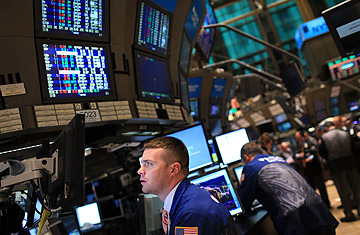
Traders work on the floor of the New York Stock Exchange at the end of the day in New York City.
Last week's brutal 628-point plunge in the Dow Jones Industrial Average, which included a 348-drop on Thursday and 140-point decline in Friday, sent shivers down investors' spines, but it didn't trigger a panic selloff among the retail crowd, who mostly invest through mutual funds.
"By and large, I think mutual fund investors have gotten used to the market volatility," says Edward Giltenan, a spokesman for T. Rowe Price. "As JP Morgan said a hundred years ago — the markets will fluctuate, and sometimes extremely so."
Investors who weathered the bear markets of 2000-2002 and 2008-2009 are less prone to push the panic button and tend to "tune out the daily market noise," says John Woerth, a principal at Vanguard. "Mutual fund investors have grown accustomed to volatility." Although Vanguard experienced its busiest trading day of the year last Thursday, only a small minority of investors actually took money off the equity table by redeeming or trading out of a stock fund, says Woerth. "Some of the activity was people looking to buy on the dips," he says.
The markets have been on a wild rollercoaster ride over the past week, with the Dow Jones Industrial Average free-falling 998.5 points, or 9.2%, on Thursday before rebounding partially to finish the day down 348 points, or 3.2% — its largest one-day point drop since February 2009. The selloff continued on Friday over worries that sovereign debt concerns in Greece could spread to other nations. For the week, the Dow was down 5.7%.
Make no mistake — there was some selling among mutual fund investors during this period, "but nothing crazy," says Vincent Deluard, a strategist at TrimTabs Investment Research, which monitors mutual fund flows. "It's not like the retail guy had a panic attack and sold massively."
Indeed, about $8.2 billion flowed out of U.S. equity mutual funds last week, which is far smaller than the $24 billion that rushed to the exits during the week that ended on Oct. 15, 2008 during the heart of the 2008 correction, according to TrimTabs. Deluard notes that the $8.2 billion represents only 0.2% of the $4 trillion in total mutual fund assets. "So 99.8% of investors left their money in the market for the week," he says. Withdrawals were heavy, however, in European funds.
Deluard believes most of the speculative money in U.S. equity funds was driven from the market during the credit crisis; and much of the cash that remains is long-term money. "So, it would take more than a trading glitch at the NYSE to get them out," he says. Also, even though stocks have rallied sharply over the past year, individual investors haven't rushed into hot stock funds like they've done in past. Over the 12 months ended March 31, roughly three out of every four retail dollars invested went into bond funds, while only one out of four dollars went into equity mutual funds.
Perhaps the tenor of the news also helps explain the muted response from the retail crowd. For many U.S. mutual fund investors, the debt crisis in Greece and concerns about the euro don't hit home the way domestic issues, such as rising home foreclosures and unemployment, do. "They don't think — What will happen to my portfolio if Greece defaults," Deluard says.
On the domestic front, financial news is still largely upbeat. Last week's Labor Department employment numbers indicated 290,000 jobs were created in April — the biggest gain seen since the recession started. However, the jobless rate also ticked up to 9.9% from 9.7%. Even more relevant to investors, first quarter earnings have been positive, with S&P 500 revenue up 13% and net income rising 45.4% on average, according to Zachs Investment Research.
Deluard speculates the Dow Jones Industrial Average would likely have to fall below the 8,000 level before there would be a massive selloff among mutual fund investors.
"The market is up 60% or 70% since March 2009, so if they lose 5%, they're still up 55%," he says. But if the DJIA breaks 8000, which would be represent a 25% decline, "then people would start worrying .. and questioning whether this rally was real or not."
